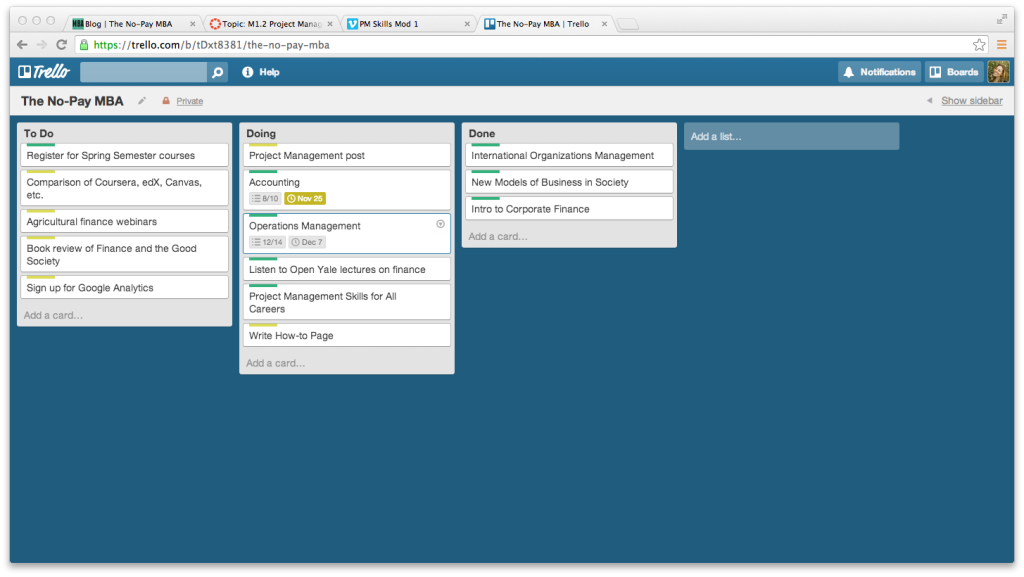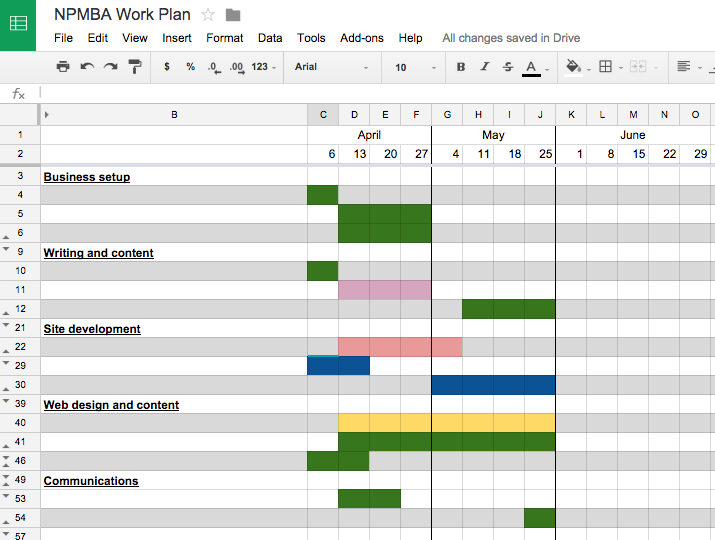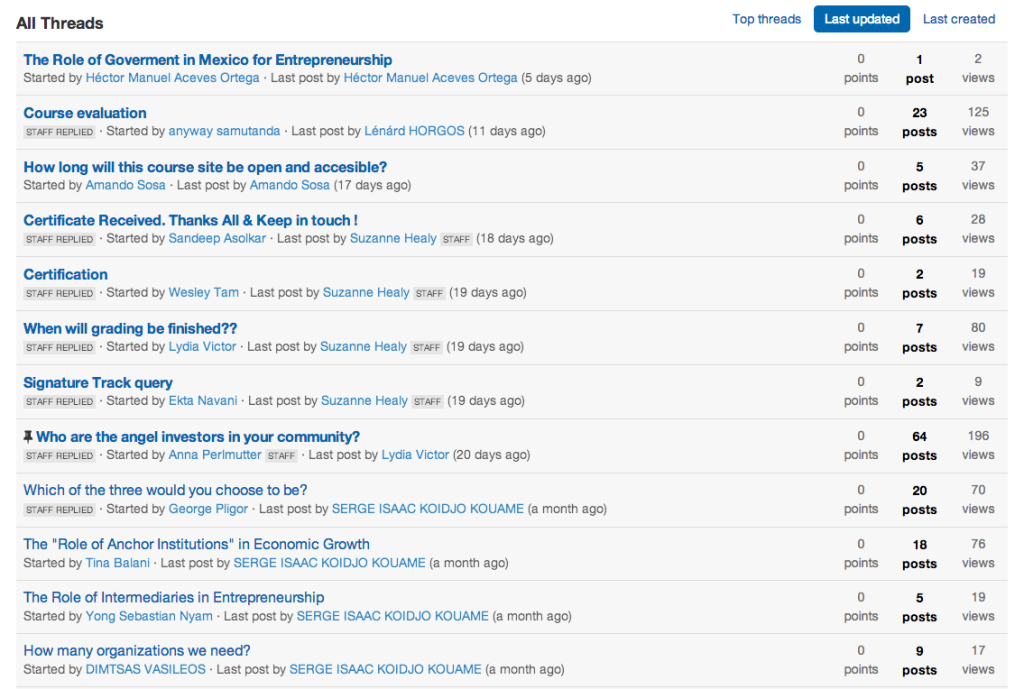by Laurie Pickard | Apr 18, 2015 | Career Development, Community and Networking, Most popular posts

I am what you might call a solopreneur, which Urban Dictionary defines as “an entrepreneur who works alone, ‘solo,’ running their business single-handedly. They might have contractors for hire, yet have full responsibility for the running of their business.” This describes No-Pay MBA to a tee. While I am in some ways a one-woman show, I have managed to assemble a team of consultants who are helping me get to launch day of what I’m calling No-Pay MBA 2.0.
One of the most exciting things about the No-Pay MBA project is its global nature. Almost every country in the world is represented among my readers. Likewise, those who have pre-registered for No-Pay MBAs come from every place imaginable - from Durban to Dallas, Mexico City to Mumbai.
My team is similarly global. Andrea is an American living in Rome, and she’s helping with social media and communications. Adam, a British guy living in Mexico, is on web development. If you take a look at some of his work, I think you’ll see why I’m so excited about what he’s doing to help me build the profile section of the new and improved No-Pay MBA website. Greg in Australia is helping with front-end layout and design; and Kevin Meldau, who is South African and living in Florida, is working on graphic design. He’s just created a new logo that I’m really excited about, and you can see other samples of his work here.
If you count both our places of birth and the countries in which we currently reside, this team of five represents seven countries. Only two of us are in the same time zone.
I’m studying management in my MOOC coursework, but working with this team to launch this business has also been a great experience in project management. I tend to enjoy the challenge of pulling together a great product on a tight deadline. Working with a geographically dispersed team has added a level of complexity to this endeavor that has forced me to up my game.
Below are some of the tools I’ve found helpful and some tips for managing a working relationship even when you’re miles apart.
Tools and tips for managing a global team
You are probably very familiar with the big dogs of remote teamwork - Google Drive and Dropbox for sharing documents, Skype and Hangout for communication.
But here are a few other free tools you may not be aware of.
Tools for working across time zones
World Time Buddy
World Time Buddy is a handy reference for scheduling when you’re in separate time zones. The free version allows you to compare three time zones.

Time Trade
I’ve just started using TimeTrade to schedule appointments. This helpful service allows me to specify when I’d like to schedule which type of appointments and allows clients to book time on my calendar themselves.
Google Calendar
And of course there’s that old standby Google Calendar. What you might not know about Google Calendar is that it automatically translates calendar invites into the recipient’s time zone.
Tools for managing work
Trello
Trello is a simple but powerful application for visual project management. It uses a system called Kanban, in which the project is mapped out using cards. The cards can be moved and rearranged to indicate level of priority and the stage each task is in. Adam and I are using Trello to collaborate on web development.

Gantt Charts
I’m a big fan of Gantt charts for mapping out and visualizing the project timeline. I like to create my own Gantt charts in Google Sheets and then add my team members as collaborators, but there are plenty of free web-based tools that can be used for the same purpose. The chart below shows how I’ve color coded various elements to indicate which person is taking the lead. This article has some great suggestions.

Tools for finding talent
ODesk
I used ODesk for the first time while assembling this team. If you haven’t heard of it, ODesk is one of several sites that act as a marketplace for freelancers to sell their services. These sites are all part of an emergent re-ordering of the workforce, which I find totally fascinating. If you’d like to better understand this new flexible work economy, The Economist had a great piece on the future of work a few months back.
Coursolve
Yes, I am a solopreneur, but I don’t plan to stay solo forever. I’m using Coursolve, a digital internship platform, for my long game. I recently posted a No-Pay MBA project to the site, which I hope will help me further hone my management skills and build my network of talent. If you’re interested, you can join my project here.
Tips on managing a global team
Peter Drucker, who is sometimes called “the father of modern management” is reputed to have said that “organizational culture eats strategy for breakfast.” While the true origin of this quote is up for some debate, its wisdom is generally accepted. Human relationships are the most important part of any business. Creating strong relationships can be more difficult when your team members are not physically in the same place, but it’s still just as important.
Use video, even when it’s awkward.
Don’t underestimate the importance of seeing the face of the person you’re working with. I do a lot of work via email, but a call every once in a while goes a long way towards establishing the kind of human connection that fosters a good working relationship. Even when my connection speed is giving me grief, I still like to at least start face to face in any online call. Whether or not I turn my camera off, this little bit of face time helps to establish a connection.
Make sure consultants see their part in the whole.
It’s important for anyone working on your project to understand where they fit into the big picture, how you plan to use their work, and why it is critical to the success of the project.
Be clear about expectations.
Especially when working with consultants who are not full-time employees, it’s important to make sure that both parties are in agreement about what work is to be done, what constitutes a successful outcome, and of course, compensation.
Tell your people you appreciate their work.
This is so important. Everyone needs to be recognized when they’ve done good work.
In that spirit, I’d like to close this post with a few shout-outs:
Andrea, thank you for being so organized and on top of things. You’ve cut my stress level tremendously and given me what feels like extra hours in the day to get things done.
Adam, thank you for your collaborative work style. I love that I am working with you on my site and that you’ve taken the time to understand my vision for it.
Greg, thank you for all your tips and pointers on SEO and for your great suggestions on design. I can’t wait to see what you come up with!
Kevin, I love your vision and your enthusiasm. Thank you for stepping up to fill a critical need at just the right time.
by Laurie Pickard | Feb 9, 2015 | Career Development, Community and Networking, MOOC MBA Design, Most popular posts
I’m pleased to share a guest post by Nick Switzer, who offers a tremendous example of how a MOOC MBA can be even more valuable than a traditional MBA. For those considering a No-Pay MBA, I expect you’ll find his story as inspiring and intriguing as I did. Enjoy! -Laurie
Why I turned down a company-paid MBA for a No-Pay MBA
 Everyone pursuing a No-Pay MBA is doing so because they cannot afford a traditional paid, brick and mortar MBA, right? A No-Pay MBA is the only option; otherwise, we would all enroll in traditional MBAs, right?
Everyone pursuing a No-Pay MBA is doing so because they cannot afford a traditional paid, brick and mortar MBA, right? A No-Pay MBA is the only option; otherwise, we would all enroll in traditional MBAs, right?
Not necessarily.
I work for a fantastic company with great benefits. One of those benefits is tuition reimbursement. If I take university courses that pertain to my role at the company, then the company pays for my tuition. As an engineer transitioning to a more business-oriented engineering role, I needed some financial and business training. My managing director (let’s call him Steve) knew this, and during a one-on-one lunch he suggested that I pursue a traditional MBA, taking advantage of the company’s tuition reimbursement policy.
I was flattered. Steve was my manager’s manager, a role model in the company, and he was telling me that the company would fund my MBA! However, after some deliberation, I declined this offer in favor of a No-Pay MBA using Coursera and other MOOC providers.
Why did I do this? How could I turn down such a generous benefit from my company?
I’ll give you 5 big reasons.
1. I value my time with my family.
When I started my No-Pay MBA, my wife and I were expecting our first child. My wife was a successful marketing manager for a Fortune 500 company at the time, with no plans to leave her role after maternity leave. I was committed to supporting her career, our family development, and my own career. I did not think it was possible to both perform well at my job and be a supportive father and husband, all while attending MBA classes and studying.
With a No-Pay MBA, I watched half of each weeks’ lectures in the same amount of time I would have spent in traffic commuting to off-site classes. Often I would do my courses while my child was sleeping, either early in the morning or late at night.
In this way, MOOCs allowed me to maximize time with my family.
2. I needed to learn quickly and apply my skills immediately.
In my new role, I needed business strategy and finance understanding immediately! Time lost taking the GMAT, GRE, selecting a program and applying meant real business opportunities lost. Through MOOCs, I was able to access top educational content within minutes of choosing my courses!
By the time director Steve suggested I start a paid MBA, I had already started 2 courses that were paying dividends in the office.
I immediately applied principles learned in class in the workplace with many co-workers who had graduated with paid MBAs, honing my learning in real-life scenarios.
Unlike a traditional MBA, I have the ability to share course materials directly with my co-workers as well. This has resulted in empowering my project teams to learn principles on the fly, when they need them most.
3. I wanted to choose my courses based on what would be most helpful at work.
One of the things I love most about MOOCs is the ability to craft my own curriculum.
I have a passion for data-driven decisions, so I am taking a 10-course Data Science specialization from Johns Hopkins as a focal point in my No-Pay MBA.
This type of curriculum flexibility and the ability to take courses from multiple top universities is simply unbeatable.
This was also helpful to my company because I was able to take the courses I needed immediately. I needed financial analysis and negotiation strategy, and I was able to take those courses right away.
4. I saved my company a lot of money.
In the recession of 2008, many companies suspended their tuition reimbursment programs for at least 6 months. I did not want to see my further education as a financial burden to my company.
As a responsible employee of my company, I made a serious cost-saving decision in pursuing a No-Pay MBA. This was an easy point for my director to understand.
My company is still investing in me, more in time commitment than in cash. This investment has paid off quickly, as my No-Pay MBA has armed me with frameworks that allow me to attack problems quickly.
5. I want MOOCs to succeed!
I believe broad, low-cost access to excellent educational materials will help our world, enriching lives and offering new paths to personal achievement and more stable economic conditions.
I want my daughters to live in a world where they have access to top-notch education without going into significant debt.
I want to see MOOCs succeed. What better way to help this happen than as a living example of the power of low-cost online education?
The Results
 Since I started my No-Pay MBA, my wife and I have been fortunate enough to have two great little daughters. My wife has been promoted, and because our schedules aren’t in conflict, she has been able to go on several international work-trips while I take care of the kids after work.
Since I started my No-Pay MBA, my wife and I have been fortunate enough to have two great little daughters. My wife has been promoted, and because our schedules aren’t in conflict, she has been able to go on several international work-trips while I take care of the kids after work.
On the job, I use frameworks and concepts from my courses every day. Thanks to my No-Pay MBA, I am totally comfortable having high-level financial and business strategy discussions with graduates from traditional MBA programs. I have also earned a promotion since starting this adventure in non-traditional education.
Bottom line: a No-Pay MBA aligned better with my goals of work-life balance and prioritization of my family than a standard MBA would have. It has been fantastic for my family, for my company and for me.
Nick Switzer is an engineer, a German-English technical translator, and a lifelong learner. To see his complete MOOC MBA transcript, visit www.nickswitzer.us.
by Laurie Pickard | Jul 20, 2014 | Community and Networking, Courses, Platforms, and Profs

If you’ve been reading my blog for a while, then you know that my MOOC pet peeve is when professors require students to post on discussion forums as a part of the course grade. It creates a lot of meaningless chatter - one person writes something mildly intelligent, and a hundred others post something to the effect of “I agree.” In general, I avoid courses that come with such a requirement. But I decided to look past this bias when I registered for “Beyond Silicon Valley: Growing Entrepreneurship in Transitioning Economies.” As I’ve written previously, this course was enormously relevant to my work. So rather than let my negative feelings about obligatory posting get in the way of my experience, I decided to make the course a laboratory for experimenting with how to get the maximum value out of discussion forums.
Here is what I learned:
1. Skip the Introductions Thread
Maybe you want to glance through the introductions, skimming for anything particularly interesting. But in general, the introductions thread is a blur of names and nationalities and people expressing their excitement about the course. Instead of making that your starting point, I suggest thinking about the kinds of people you’d be most interested in engaging with or what you’re hoping to learn in the course. Then instead of reading post by post, search the entire discussion forum on those topics and see what comes up. For example, I usually start by searching on “Rwanda” and “Africa” to see who else is taking the course from my neck of the woods.
If nothing comes up, or if the posts on your topics of interest are scattered within the forum, start your own discussion thread based on geography, background, or field of interest.
2. Fill Out Your Profile, and Include a Photo
This is really important. Savvy social media users always do a bit of investigation on who they’re dealing with before responding to a post. This isn’t creepy, it’s smart. On your own profile, include a very short summary with one or two interesting facts about who you are and what you do, who you’re hoping to interact with in the course (optional), as well as links to any other social media you want people to reach out to you on.
If you’re stuck for what to write, try this template:
“I’m a _______________________ working on _________________________. I’m taking MOOCs in order to ______________________________. I’d love to connect with others who share my interest in _____________________ and _________________________. You can also find me on LinkedIn, Facebook, Twitter, and _________________________. “
For example:
“I’m an international development professional working on entrepreneurship and public-private partnerships in Kigali, Rwanda. I’m taking business courses as part of project to construct a free MBA equivalent out of MOOCs. I’d love to connect with others who share my interests in development and entrepreneurship or my enthusiasm for MOOCs. You can also find me on LinkedIn, Facebook, Twitter, or on my website at www.nopaymba.com.”
When others in the course post interesting comments, check their profiles before responding. You may find that you’re interacting with someone in the industry you’d like to move into, and you now have a great point of entry for a conversation.
3. Facilitators Make a Difference
The professor of “Beyond Silicon Valley,” Michael Goldberg, was a stellar forum facilitator. Throughout the course, I often wondered how he found the time to make so many personal connections, partcipate in so many discussions, and respond to so many comments. He helped keep discussions on track, made introductions among students, and generally kept the level of engagement high.
But not every course is led by a facilitator with as much verve and enthusiasm as Professor Goldberg. What then?
If you’re in a course that lacks strong facilitation, I suggest trying to play that role yourself. While they don’t have the star power of professors – who doesn’t like getting a few good strokes from the teacher? - students can also be facilitators. By taking a meta view of the discussion, trying to spark conversation, and focusing on connecting people, you the student can have a better forum experience and up your chances of making connections.
4. One Real Connection is Worth a Thousand Up-Votes
By far the most active group on the forum, and the group that seemed to get the most out of the course, was a group from Greece. They met in person periodically, developed real connections to one another, and used the forum as a supplement to a face-to-face conversation they were having. But what if, like me, you’re in a place where you can’t do that? Or what if you simply don’t have the time for in-person meet-ups?
It is tempting to gravitate towards the discussion threads where the most is happening – most posts, most up-votes, most people. But I suggest doing the opposite: find a niche where you can substantively engage with a few people on a topic you are passionate about; then focus on making one or two connections that are strong enough to take outside of the classroom.
I started “Beyond Silicon Valley” thinking I would form a group of people who could interact via video chat throughout the course – a sort of virtual study group. To that end, each week I created a discussion thread called “Africa Study Group.” A few times I floated the idea of a video chat, but no one expressed interest. I also joined the Facebook and LinkedIn groups for the course. Not much seemed to be happening there either.
By the end of the course, I hadn’t managed to get a stable study group going, but I did have some great conversations with an entrepreneur in Africa who shares my interest in the potential of MOOCs for the continent. I realized that in the end, this one connection was probably just as valuable as a study group would have been.
Overall, I’m still not sold on discussion forums, but at least now I can find some good in them. I’m curious as to others’ experiences in MOOC discussion forums. What’s your opinion on mandatory forum posting? What value have you found in forums?
by Laurie Pickard | May 17, 2014 | Community and Networking
I’m excited to present another student profile. Joris is from Utrecht, Netherlands. He reached out to me to describe an ambitious MOOC course load, focused on business and education – he’s taking more than 10 MOOCs at once. I was surprised to find out that Joris is simultaneously enrolled as a university student in not one but two degree programs! Below he shares his reasoning for taking so many courses and some great tips for MOOC students taking a full course load.
 Name: Joris Schut
Name: Joris Schut
Country of Origin: Netherlands
Lives in: Utrecht, Netherlands
Age: 24
Occupation: Student of Educational Science and Technology (masters) and Library- and Information Science (postgraduate studies)
What made you decide to take so many MOOCs when you are already enrolled in two degree programs?
“I am about to finish my studies so I still have a relatively large amount of time. Once I really start my career this time will very likely decrease by quite a bit. Therefore, this is the perfect time to do 10+ MOOCs parallel.
Although I am indeed in a degree programme, there is also a trend going on that ‘just having a degree’ is not enough. Any opportunity to something outside of the norm is good for your employability.”
How did you choose business and education as fields to focus on in your coursework?
“Business (including finance) is, together with teaching, computer science, humanities and the natural sciences, one of the big categories of courses that are offered. I did not see the pay-off for the humanities (not known for their great economic potential), the natural sciences (either too basic or not relevant for me), or computer science (there are other ways to learn this and the topics were too advanced for me at that time).
Teaching is fairly obvious as it is in line with my formal education. Furthermore, I think in order to be an advocate for online education you need to be an expert to some degree on this topic.
Joris’s Tips For Managing a Full MOOC Course Load
Tell others – colleagues, fellow students, friends, teachers and parents – what you are doing. Most people do not know what a MOOC is and might wonder what you are doing (especially if you do more than 2-3 MOOCs in parallel).
Get a buddy for each course you do. Knowing someone else who does the same course can motivate you. There is no real need to meet but just knowing who someone who is in the same course can help (at least for me).
In many platforms you can modify the playback speed. If you can manage to keep up it will save you time viewing lectures (I usually play videos between 1.25x and 2.00x.) Note this can have a downside as well: I sometimes think my real life professors are talking slow and I wish I could make them talk faster.
As with everything in life, balance your course load with your other activities as it is easy to spend all your time on MOOCs (there is just too much interesting stuff). What is a good balance will vary from person to person. Today, I decided to un-enroll from a couple upcoming courses as I realized it would conflict with other (real-life) activities.
Put the skills you learn on your CV instead of the individual courses (as you suggested in one of your previous posts).
Keep all the things you submitted for a peer assignment on your local computer. Instead of just submitting also make a copy in a text file (or any other format). This allows you to develop a portfolio which you can use later to show your work.
by Laurie Pickard | Mar 9, 2014 | Community and Networking
I’d like to introduce two more people who have reached out to me since the last time I posted about other people who are using MOOCs to create MBAs. If you’re reading this and you’re doing the same, I encourage you to share your story with me. The two women I’m profiling below are both mid-career professionals, lifelong learners who have been finding ways to continue their educations since long before MOOCs became a thing. Read on for more information about how these women are using MOOCs to meet their personal and professional goals.
 Name: Chiara Bersano
Name: Chiara Bersano
Country of origin: Switzerland
Lives in: California, USA
Age: 50
Chiara works in IT. She currently manages HR information systems for large corporations. She blogs at chiarabersano.blogspot.com.
“My life still doesn’t afford me the extra time to go back to school; and programs that I have evaluated tend to be exemplary for how they address other people’s need for development, but never seem to truly apply to me.”
“When I read an article about people using MOOC courses to build MBA-like programs at a fraction of the cost of a classic MBA [that’s this article about the No Pay MBA], I had an ah-ha moment. In fact, that was exactly what I had been doing all along, without thinking of formalizing it.”
“Here is my current, carefully culled list (but most likely not my final list… the great thing of such a plan is that it doesn’t have to stop!). Most of the time, I can’t manage more than two at the same time; but the most challenging part is toward the end, when deadlines multiply… I can add multiple courses, and drop out if it becomes too much - there is no penalty there.”
Courses Chiara has taken:
International Organizations Management, University of Geneva on Coursera
Globalization’s Winners and Losers, Georgetown University on EdX
Design Thinking for Business Innovation, University of Virginia on Coursera
Public Privacy, Universiteit Utrecht on Iversity
Designing and Executing information security strategies, University of Washington on Coursera
On-going course work:
Gamification, University of Pennsylvania on Coursera
Globalization of Business Enterprise, IESE Business School on Coursera
Wiretaps on Big Data, Cornell University on edX
The European Union in Global Governance, KU Leuven and Universität Passau on Iversity
Upcoming courses:
Introduction aux Droits de l’Homme, University of Geneva on Coursera
Organizational analysis, Stanford University on Coursera
Design Thinking, MHMK Macromedia University for Media and Communication on Iversity
The Changing Global Order, Universiteit Leiden on Coursera
Configuring the World, Universiteit Leiden on Coursera
La visione del mondo della Relatività, Università della Sapienza on Coursera
International Organizational Behaviour and Leadership, Università Bocconi on Coursera
 Name: Michelle Krumholz
Name: Michelle Krumholz
Lives in: Chicago, USA
Age: 44
Michelle is a middle school science teacher for Chicago Public Schools, a position she has been in for 16 years and still loves. She’s also a mom of two teenagers and has been married for 22 years. Michelle is working on building a startup business centered around a website for teachers. The site itself is still under construction, but in the meantime you can follow her on Twitter @evolvededucator.
“I’ve always worked to pursue learning opportunities for the least financial commitment. Most recently I earned a math endorsement (21 hours) for free from the University of Chicago and an ESL endorsement (21 hours) from an online university for minimal cost. After I achieved five endorsements which directly improved my teaching skills, I decided it was time to broaden my scope of knowledge in order to build thinking skills for my students which will serve them during college and their careers.”
“When people ask why I’m pursuing an MBA, I reply why not? I’m learning about how our global economy works. I’m able to speak intelligently about business so I can communicate to my students what to expect and where to focus their thinking and efforts. Also, I’m truly interested in business. Besides teachers, everyone I know is in business. I like to be able to intelligently participate in conversations. I have everything to gain from learning a new skill set. Now that I’m pursuing this start-up venture, pursing an no pay MBA is a win scenario from every angle.”
Currently taking (all from Coursera):
What’s Your Big Idea? through University of North Carolina at Chapel Hill.
Financial Markets through Yale University and in about two weeks I’ll start
An Introduction to Operations Management through Wharton School of Business.
by Laurie Pickard | Feb 2, 2014 | Community and Networking
Last week, I put out a call for others like myself who are using MOOCs to do the equivalent of a complete MBA. I received responses from all corners of the globe – from Boston to Dubai. Allow me to introduce four fascinating people who are taking advantage of free online resources to reach their educational and career goals.
 Name: Brian
Name: Brian
Age: 27
Lives in: Boston, MA
“Currently, I work as a tax lawyer for an accounting firm in Boston. I am committed to completing a MOOC MBA because, after completing a BA in English (what do you do…), a J.D., and a Tax LL.M., I have some gaps in my financial and quantitative education. I would like to use MOOC courses to expand my knowledge, encourage my intellectual curiosity, and develop skills to add value to my firm’s clients. After finishing my MBA coursework, I hope to transition into higher-level management while maintaining a strong focus in tax and finance.”
Has completed the following coursework:
- Introduction to Finance
- Gamification
- Grow to Greatness: Smart Growth for Private Businesses, Part II
- Global Business of Sports
Currently enrolled in:
- The Power of Microeconomics
- The Power of Macroeconomics
- Foundations of Business Strategy
- Critical Perspectives of Management
- Grow to Greatness: Smart Growth for Private Businesses, Part I
“I think continued education and lifelong learning is the key to success in whatever you choose to do. Intellectual curiosity allows you to realize when to ask questions and what questions to ask. I would encourage everyone to use the structure from MOOCs to pursue one’s passions. For me, I am passionate about financial education, literacy, tax, finance, and educational reform. I hope to use my knowledge and experiences to support others who wish to create change through their own businesses and financial pursuits.”

Name: Kathy Hilsinger Walliser
Age: 62
Lives in: Greensboro, NC
“I am writing a PhD dissertation on Schistosomiasis, a neglected tropical parasitic disease. I have developed a range of preventatives. So, I needed to find out how to set up a corporation to make this and distribute it to the 700 million people at risk worldwide. Answer: open course MBA.”
Kathy’s goal is to eradicate Schistosomiasis from humankind, just as Smallpox and certain types of Polio have been eradicated.
Currently enrolled in:
- Introduction to Corporate Finance by Dr. Franklin Allen, The Wharton School.
“I tell people that NOW they can do it. There is a world of knowledge out there and with the courses, texts, lectures, and background reading, it can all come together. MANY subjects, languages, interests; there is something that they can pursue.”
 Name: Penelope Perez
Name: Penelope Perez
Country of origin: Mexico
Lives in: Dubai, UAE
Penelope works as an account manager in the advertising industry. Her reason for doing a No-Pay MBA is,
“ to acquire the necessary tools to start my own business. I’m passionate about Social Innovation, so I would like to apply all the knowledge and experience to my own business and become an active agent of positive social change.”
Currently enrolled in:
- Foundations of Business Strategy (University of Virginia via Coursera)
- Critical Perspectives on Management (IE Business School of Madrid via Coursera)
“I’m really happy to have found accessible ways to get high quality education by MOOC. I’m happy and feel lucky to be part of this project (The No-Pay MBA), and I realize there are plenty of people determined to continue learning, each for different reasons. The most important thing is that people see beyond the economic/time restrictions and try their best to accomplish their goals.”
 Name: Greg Widders
Name: Greg Widders
Age: 23
Country of origin: Australia
Lives in: Sydney, Australia
Greg works as a Digital Marketing Coordinator for a large windows and doors manufacturer across Australia and parts of Asia.
“Going through University completing a Bachelor’s degree in Industrial Design I felt completely flat about learning. I wanted to get out, get a job, work during work hours and then go home and just do nothing! Not a year into work, I’ve taken a sidestep into marketing and I have secured my first promotion to a position where I am learning on the job. I have been completely reinvigorated! I work longer than I need to, and then when I get home I find myself searching tutorials to help me at work or develop another skill further. I want to complete a MOOC MBA because it gives direction to this drive. I also want the flexibility to change my study load at the drop of a hat without consequence. I’m at a point in my life where some interesting things are on the horizon and I feel locking myself into the structure of a full MBA is not right for me at this moment in time. Another point is that more and more I’m discovering it’s not the degree that impresses bosses, it’s a demonstration of a willingness to learn. Image going into a job interview and saying, ‘I completed my bachelor’s degree and then over the next two/three years I completed the equivalent of an MBA through online courses from the likes of Wharton, Yale, Harvard while working full time.’ I think that shows a willingness to learn.”
Currently enrolled in (all from Coursera):
- Foundations of Business Strategy
- Developing Innovative Ideas for New Companies: The First Step in Entrepreneurship
- Introduction to Finance


















